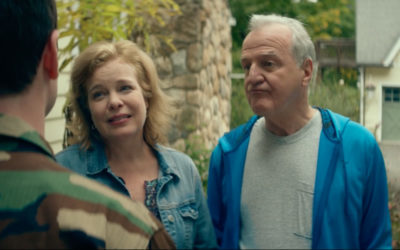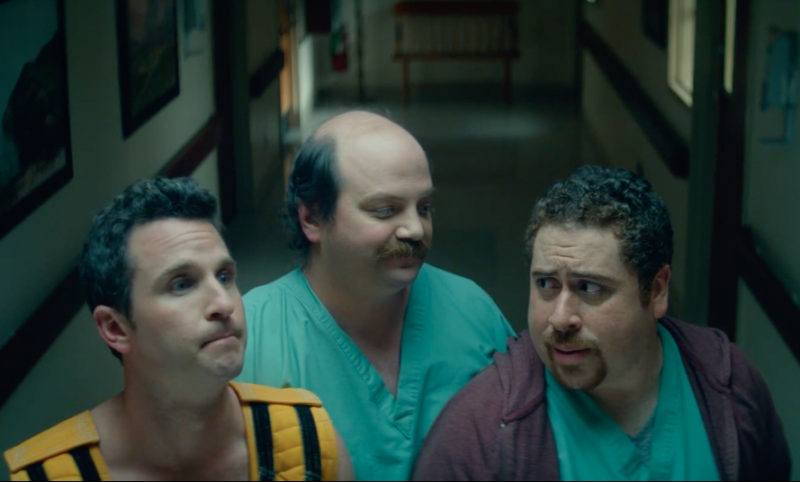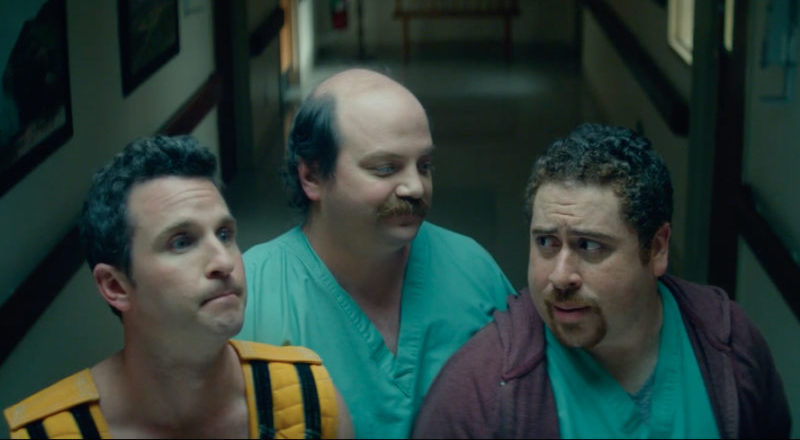INTERVIEW: These characters want to be ‘Crazy Famous’

In the new comedy Crazy Famous, the main character, Bob (Gregory Lay), has a lifelong obsession with becoming famous. He’ll do just about anything for the headlines, and that makes for some comedic results. His main adventure in the movie, which will be released Tuesday, Jan. 9 on video on demand, digital HD and DVD, finds him escaping from a mental health institution to capture Osama Bin Laden. He’s unwilling to accept that the terrorist leader is actually dead.
Crazy Famous comes from director Paul Jarrett and debut writer Bob Farkas. Recently, Hollywood Soapbox exchanged emails with Farkas about the new comedy. Questions and answers have been slightly edited for style.
What inspired you to tell this story?
My actual inspiration for the film originates from an entry written by my father in my baby book. He wrote: ‘the next great NBA player.’ That got me thinking … when your parents looked in your crib at birth, they probably dreamt of you becoming a great actor or athlete or Supreme Court justice. I don’t think they dreamt of you becoming a computer tech or toll collector (no offense).
I figured if I only had one chance to make a film. I wanted it to be about something everyone could relate to, and I think the desire to be famous is universal within all of us. As a matter of fact, if you offered 100 random people to wave your magic wand and make them instantly famous, 99 would say ‘yes.’ And the one person who said ‘no’ is probably lying.
My inspiration also came from my own observances of our modern-day culture. It seems everyone harbors a desire to be famous. Everyday there’s a story in the news of someone trying to get their name in lights, and contrary to the old days, it doesn’t matter if they have talent or skill. It also doesn’t matter if it’s for something positive or negative.
As your feature film debut, what was the process like writing the script?
Unlike most folks in the film industry, I never went to film school or took a class to learn the fundamentals of screenwriting, so basically I created my own process for writing a screenplay. In my case, after I came up with the idea for my story, I wrote a scene-by-scene outline. Then I created the characters. After that, all I had to do was write the detail for each scene. Since I wanted each scene to be the best I could make it, I often skipped around. That led to me writing the opening and closing scenes first, and then completing the other scenes whenever I came up with a good idea.
The whole process took basically four years. What surprised me the most was that I never finished writing the script until the last day of production. Since I served as both producer and writer, I was on the set every day (this is rare for writers from what I was told). So I did quite a bit of rewriting as our cast and crew gave me a lot of valuable input. On a couple occasions, I found myself rewriting a scene only a few hours before we were scheduled to shoot it.
As a sidebar, in my opinion, the entire process of writing a screenplay was like giving birth. You create a script out of thin air and nurture it until it’s ready to function on its own. I actually felt a little lonely when the script was completed because it was like saying goodbye to old friends — the friends being the characters you created.

What was it like to work with director Paul Jarrett?
The great thing about Paul was in addition to having basically the same vision of the script I had, he also had an extensive background in the business side of filmmaking. This was important because my biggest fear in making a first feature was going over budget. So I was really happy Paul wasn’t one of those artsy-fartsy directors who wanted to spend an extra $30,000 at the last minute just to get the sun shimmering off the water a certain way.
Working with Paul was a fairly positive experience. After every take, he would always ask if I had any comments or corrections. There were a few differences of opinion and some bumps and bruises along the way. But on the whole, I think we got along pretty well, and more importantly, Paul did a fantastic job as evidenced by what’s on the screen.
Did the script change a lot from your first draft to what audiences will see?
I’d estimate that 70 percent of what I had on my first draft will be seen by audiences. A good portion of changes were based on budgetary and time constraints. I’ve been told that in order to write a good script, you should do so without a budget in mind, but that’s not necessarily true. You can’t write a script that needs a $10 million budget and make it for $1 million (and vice versa). The other changes were mostly from input I received from the cast during the actual shoot (as I described in the question about the scriptwriting process).
How does a comedy writer know when a line is funny? Does it take hearing the cast say the line?
Interesting you ask because I remember asking the very same question to my co-producer (Vince Maggio) during production. He said, ‘If the crew laughs while shooting the scene, then you know it’s funny.’ Thankfully our crew was laughing quite a bit during shooting, and the cast did a great job of adding their own little touches to make a scene or dialogue even more humorous.
Writing comedy is really instinctual. My personal preference is to write humor based on situations rather than just telling jokes, and as far as determining what is funny, if I can read my script a thousand times over and still laugh or smile at the humorous parts, then I know it must be funny.
By John Soltes / Publisher / John@HollywoodSoapbox.com
Crazy Famous will be available Tuesday, Jan. 9 on VOD, digital HD and DVD. Click here for more information.

